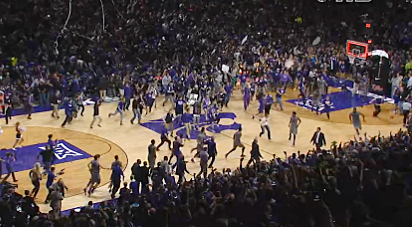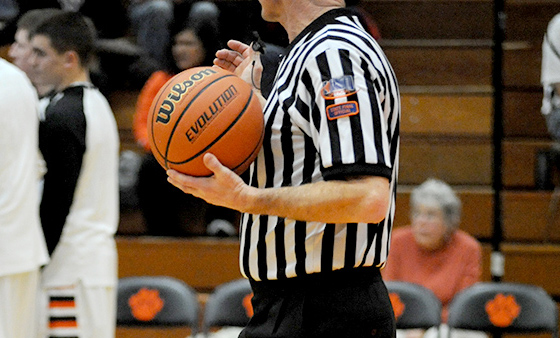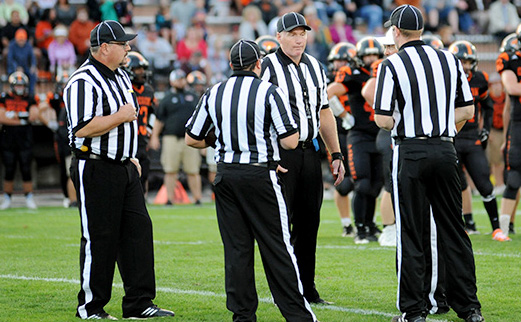The AD’s Role in Fan Control
Sportsmanship and fan control are not new concerns — this issue has been center-stage for decades and still remains a problem for many. As a result, some state athletic associations have implemented programs and initiatives, and state legislatures have passed laws to combat unruly fans.
During the 2013-2014 school year, for example, the New Jersey State Interscholastic Athletic Association introduced a ban on trash-talking which meant an automatic disqualification. This initiative also covers fans and includes verbal harassment and physical contact. On the other side of the country, the Oregon School Activities Association created a Positive Cheer initiative in which no negative cheers are allowed. This is in keeping with the concept that athletics has educational value.
While these state-sponsored efforts are a great step forward with respect to controlling disrespectful, problematic fans, the ultimate responsibility still falls on the athletic administrator’s shoulders. It is incumbent for all schools to have prepared fan expectations, protocols for dealing with those who operate outside the parameters and take proactive steps to prevent and solve problems when they do occur. Is this a huge and important responsibility? It sure is, but also one which you cannot avoid or abdicate. Not everyone may be ready to accept this ultimate responsibility because there may be quite a bit of resistance and it may not be popular. When the topic of sportsmanship, for example, was being discussed at a state conference, one athletic director shared “you have to let the kids have some fun — it can’t all be confining rules and expectations.” And another quickly added, “you can’t constantly say ‘no’. Zero tolerance just doesn’t work.”
Not everyone may be ready to accept this ultimate responsibility because there may be quite a bit of resistance and it may not be popular. When the topic of sportsmanship, for example, was being discussed at a state conference, one athletic director shared “you have to let the kids have some fun — it can’t all be confining rules and expectations.” And another quickly added, “you can’t constantly say ‘no’. Zero tolerance just doesn’t work.”
Are you kidding? Not only as a professional in an educational setting but as an adult, it is an athletic administrator’s responsibility to explain expectations and hold everyone to those standards. Sportsmanship and fan behavior are about respect, fair play, and doing what is right. One cannot sacrifice these qualities and values in the pursuit of fun or by not wanting to say ‘no.’
What needs to be done for better fan control? The following suggestions should help.
- Clearly write down what your expectations are relating to the behavior of fans. Include in your document what is acceptable and what is not and then communicate these standards to students, parents, and community members. This can and should be done in your pre-season parent meetings, posted on your website, included in handbooks and newsletters, and copies available at your ticket booth for distribution. Use any and all vehicles that you can in order to get your message across and make sure that you get upper-level administrative approval before publicizing or distributing your guidelines.
- Send a copy of your fan expectations to the athletic administrators of each one of your opponents for all sports. By doing this with an e-mail attachment, you can and should ask this individual to forward your document to all of his parents prior to the game. This is a major proactive step so that all visitors are aware of your school’s standards and the way that things will be handled in your setting. Too often, visitors proclaim, “We don’t do this at our school.” Well, this IS what we expect here.
- Analyze your security needs prior to each season. The number of individuals required will vary according to the venue, the sport, perhaps the history with your opponent, the time that the game begins, and will ultimately end and you will also want to take into consideration rivalry games. Therefore, each game has to be considered independently and this list has to be sent to the local precinct or person responsible for scheduling security.
- Use public address announcements at games to remind and reinforce your expectations for fans. In addition, each venue may have some additional guidelines which should be carefully and clearly worded. The game announcer should be prepped by the athletic administrator and understand when these announcements should be made. A written copy of the various announcements should always be available as part of the game management checklist.
- Develop a workable and suitable protocol which you will use for dealing with disruptive, out-of-controls fans. A good recommendation is to quietly walk up in the stands and sit down next to an individual causing a problem. Why take this approach? You don’t want to draw more attention or create a larger problem by involving other spectators than already exists. Trying to be subtle, calm, and unobtrusive is an important technique to use.
- Distribute written guidelines to security personnel – off-duty police officers, school resource officers, and teacher-chaperones — with respect to where to stand and what specifically to look for in the stands. You don’t want them, for example, to be standing in small groups talking the entire evening, because they do have an important role to play. Therefore, these documents should be as detailed and specific as possible, and be sent via an email attachment a day before the contest. In this manner, an assigned individual will have the opportunity to ask questions with respect to their assignment.
- Instruct your security personnel – police officers, teacher-chaperones, and administrators — to let you know when they see anything which is unacceptable with respect to your fan expectations. Explain to your other school personnel that you will first try to handle the situation yourself in an unassuming fashion. Call for help from your off-duty police or other security only when it is needed. Obviously, it would be wise for these individuals to watch as you walk into the stands to ‘meet’ with the offender and be prepared to react.
- Provide anyone causing a problem with an explanation of your fan expectations and provide a rationale if needed. But also, clearly point out that they will be asked to leave the contest if their behavior does not cease. Obviously, ask if they have any questions and understand what has to be done on their part.
- Escort unruly fans out of the stadium or gym who persist with their unacceptable behavior after their initial meeting in the stands and explanation. If necessary, you can ask security personnel to assist with this task.
- Ask all offenders to call and schedule a meeting with you the day following the contest. This 24-hour period is essential in order to allow the emotions to subside and for you to gather all of the facts which you will need for this meeting. It is important to ask security and other individuals to write down their observations and any action which they took. Also, make sure that you have copies of all written documents and fan expectations to be able to give to the unruly fan during the meeting. Be totally prepared.
- Clearly explain to the unruly fan in the meeting what they did wrong and how they have to handle themselves in the future. It is extremely important that this individual understands that if there is a repeated problem, the next step is to ban them for the remainder of the season. You need to be a combination of firm, polite, and professional in your communication with this individual. But the message ultimately has to be delivered.
- Make sure that you get administrative approval before you actually go about ‘banning the fan.’ This step is important and essential in order to ensure that you have administrative support for this course of action. In most situations, the offender will go ‘right to the top’ in order to claim that they have been wrongly treated and demand reinstatement. Therefore, you want and need upper-level support!
- Use a USPS certified letter to notify an offender that he or she is being banned for the remainder of the season. By using this form of written notification, you will receive a receipt that it has been delivered and there is no way that anyone can claim ‘I never received your letter.’ With a normal letter or even e-mail, you cannot be assured that it reached the intended individual. Whether the person read or understood the intent of the communication is completely another matter.
- Always communicate regularly with the assignors of officials and seriously review their post-game reports in reference to player ejections, problems with sportsmanship, and any incidents with unruly fans. Officials need to be respected and supported, and your efforts are vital to this critical relationship.
It is never easy to ensure proper behavior from all elements of your fans. The more time, proactive effort, and preparation, however, you put into the process, the better the results. Definitely use state initiatives as a resource for additional ideas and techniques, but the ultimate responsibility falls on the shoulders of every athletic administrator.





